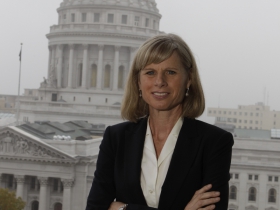More Women Run for Top Capitol Jobs
The number of women candidates running for state Capitol jobs is coming back.
The gender pendulum may be swinging back – a little more estrogen and a little less testosterone – in the Capitol.
Democratic Mary Burke would be the first woman governor, if she beats Republican Gov. Scott Walker on Nov. 4.
Republican Lt. Gov. Rebecca Kleefisch is seeking a second four-year term and would be the third women in that position. It took until 2001 for a woman, Republican Margaret Farrow, to serve as lieutenant governor.
Jefferson County District Attorney Susan Happ, a Democrat, would be the second woman elected attorney general.
Women are the Democratic candidates in seven of the 14 state Senate races between major-party candidates on Nov. 4. And Republican Sen. Leah Vukmir, of Wauwatosa, is favored over a third-party opponent.
Overall, the number of women candidates for state Capitol jobs is “coming back,” said retiring Rep. Sandy Pasch, a former assistant leader of Assembly Democrats.
But Wisconsin is still “woefully behind” overall in electing females to critical Capitol jobs, despite the 2012 victory of Democratic U.S. Sen. Tammy Baldwin, Pasch added. For example, only one in five major-party candidates in contested Assembly races is a woman.
Senate Democrats could see the biggest gain in the number of women, depending on voters’ decisions.
Five of the 15 Senate Democrats are now women, and only one of them – Sen. Kathleen Vinehout, of Alma – is seeking re-election this year.
Six other Democratic women are running against Republican men. And, two of the six – Reps. Janis Ringhand, of Evansville, and Janet Bewley, of Ashland – are running in districts Democrats have controlled for decades now represented by men who are retiring (Sens. Tim Cullen, of Janesville, and Bob Jauch, of Poplar).
Two other Democratic women – Rep. Penny Bernard Schaber, of Appleton, and Martha Laning, of Sheboygan – are running for Senate seats now held by male Republicans: Senate President Mike Ellis, of Neenah, and Sen. Joe Leibham, of Sheboygan.
All that means two things:
*The record for the most number of women in the Senate – 11 in the 1999 and 2001 sessions, according to the Legislative Reference Bureau – could be broken next year.
*A historic majority of Senate Democrats could be women.
Electing more women to the Legislature would be good for Wisconsin, said former Senate Majority Leader Mary Panzer, a Republican who is now a lobbyist.
“Women work well together,” Panzer said. “I found women to be good communicators.”
Women are also the ones who most often broker deals at home – a “consensus-seeking” skill that works well in the Capitol, Panzer added.
Panzer said the number of women elected to Capitol jobs “ebbs and flows,” but the relatively high number in this election cycle is no accident. “A lot of people have been working on that for a long time.”
Pasch said Democrats have also worked to recruit women candidates. The party started the Emerge program to identify talented women, recruit them to run for seats in the Legislature and then give then nuts-and-bolts campaign advice.
Pasch also credited EMILY’S list, a national organization, for helping female candidates – including Happ, who won all 72 counties in a three-way August primary – in Wisconsin.
And, Pasch added, more Democratic women are also being drawn into running because of “oppressive bills” sponsored by Republicans – including new medical requirements before a women can have an abortion.
Pasch also noted that dozens of older legislators retired in 2012 and this year, clearing the way for a younger generation not concerned with “gender roles.”
It’s not surprising that so many women are running this year, Pasch said. “The surprise should be: Why did it take this long?”
Panzer grew up in and around the Senate, watching her late father, Frank, broker legislative deals in the 1940s, ‘50s and ‘60s.
“I think I will see a woman governor, and I think I will see a woman president in my lifetime – although maybe not now,” Panzer said. “But I intend to live to be 100.”
She turned 63 last Friday.
Steven Walters is a senior producer for the non-profit public affairs channel WisconsinEye. Contact him at stevenscwalters@gmail.com
The State of Politics
-
RNC Brings Fame to Gen Z Party Leader
 Jul 15th, 2024 by Steven Walters
Jul 15th, 2024 by Steven Walters
-
Wisconsin’s Republican Roots Run Deep
 Jul 8th, 2024 by Steven Walters
Jul 8th, 2024 by Steven Walters
-
Feuding Supreme Court Justices Need a Break
 Jul 1st, 2024 by Steven Walters
Jul 1st, 2024 by Steven Walters






















